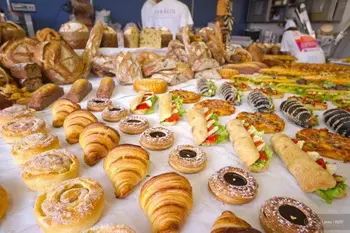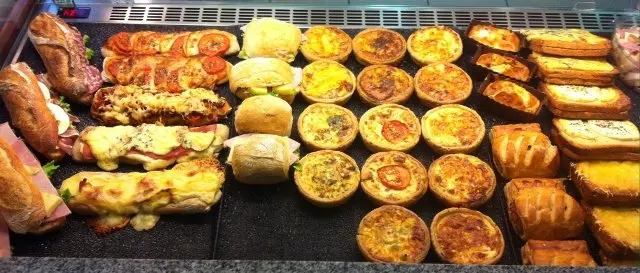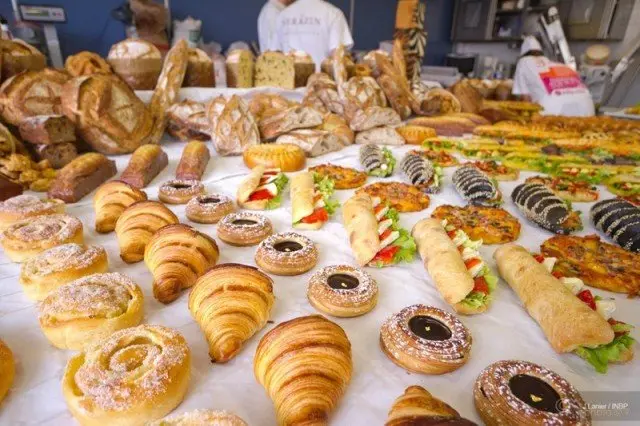This site uses only a few technical cookies necessary for its operation. By continuing to browse, you accept their use.
To find out more...
To find out more...
What is the difference between bakery and patisserie?

This is a question that you may well have asked yourself and which I will attempt to answer. In France the two trades of "boulangerie" (bakery) and "pâtisserie" (patisserie and confectionery) have always been quite distinct, but where exactly do the boundaries lie?
Last modified on: February 7th 2017
What is the difference between bakery and patisserie?
If you were to ask any baker, they would be likely to give you a one-word answer: fermentation.
It's true that this sums it up well: the bread baker always works with fermented doughs made with yeast or leaven (sometimes called “leavened” doughs). These need time to rest and rise, often for many hours, and acquire particular flavours in the process. Mastery of this fermentation or “proving” – which takes a lifetime to acquire, according to one prize-winning artisan – is the baker's trademark, the expression of his or her know-how and skill.
Fermentation is used for bread, of course, but also for the items known as "viennoiseries" (Viennese pastries): french croissants, chocolate rolls (petits pains), brioche, Danish pasties, etc. As they are made with a leavened dough, they come into the baker's domain. Another sideline for bakeries that has grown in importance in France in recent years is the sale of hot or cold savoury snacks such as sandwiches, quiches, pizzas, etc.
The "pâtissiers" take care of everything else – in short, all the sweet stuff: cakes, tarts, custards, chocolates, confectionery, desserts, etc. (but not ice cream – In France that's another specialist trade). It's worth noting in passing that there are two types of pâtissier (pastry cooks): the ones who work in patisseries (cake shops) and those who work for restaurants, who these days have taken over the all the desserts that used to be the domain of the cooks.
Boundaries are meant to be pushed, of course: it's pretty rare to find a French bakery that doesn't also sell cakes, possibly because there is a trained pâtissier employed, or because the baker has trained in both fields. Similarly, many patisseries sell viennoiseries.
As you can imagine, this naturally creates a certain amount of rivalry, and the corresponding stereotypes: French pâtissiers tend to see bakers as simple oafs, only good for handling 40 lb (20 kg) batches of dough. Bakers, on the other hand, look down on pâtissiers as fragile, weedy specimens, incapable of doing anything without weighing scales… And then there are the cooks who refer disparagingly to both these types as “flour-eaters” .
So, bakers are suspicious of pâtissiers who sell viennoiseries, and pâtissiers look down their noses at bakers whose windows are full of tarts or gâteaux. But this petty rivalry is probably a good thing, as it means that crossover products need to be up to scratch, excellent even, otherwise why bother buying cakes or pastries from the patisserie if the baker makes them better?
But all viennoiseries are not equal, unfortunately. It is scandalous that the emblematic French croissant, lovingly made by an artisan baker (a specialist viennoiserie baker is called a “tourier” ) in a proper bread oven, often has to compete with a poor, deep-frozen imitation. Unscrupulous shopkeepers – crooks, to my mind – merely unpack them from a carton and thaw them before selling to the unwary, in spite of a legal requirement to state that they are not “made on the premises” . Yes, I know, I'm ranting. But it matters: this sad state of affairs is depressing for bakers and devalues their trade – why bother working hard, even employing others, when industrial croissants can simply be thawed on demand? And consumers are being hoodwinked into believing that they are paying for the genuine artisan product.
On a happier note, maybe all is not lost. Here is a display showing what real bakers are still capable of:
I'll finish by setting you a riddle: Why do wine, bread and cheese go so well together?
Answer: Because they're all produced by fermentation.
It's true that this sums it up well: the bread baker always works with fermented doughs made with yeast or leaven (sometimes called “leavened” doughs). These need time to rest and rise, often for many hours, and acquire particular flavours in the process. Mastery of this fermentation or “proving” – which takes a lifetime to acquire, according to one prize-winning artisan – is the baker's trademark, the expression of his or her know-how and skill.
Fermentation is used for bread, of course, but also for the items known as "viennoiseries" (Viennese pastries): french croissants, chocolate rolls (petits pains), brioche, Danish pasties, etc. As they are made with a leavened dough, they come into the baker's domain. Another sideline for bakeries that has grown in importance in France in recent years is the sale of hot or cold savoury snacks such as sandwiches, quiches, pizzas, etc.

The "pâtissiers" take care of everything else – in short, all the sweet stuff: cakes, tarts, custards, chocolates, confectionery, desserts, etc. (but not ice cream – In France that's another specialist trade). It's worth noting in passing that there are two types of pâtissier (pastry cooks): the ones who work in patisseries (cake shops) and those who work for restaurants, who these days have taken over the all the desserts that used to be the domain of the cooks.
Boundaries are meant to be pushed, of course: it's pretty rare to find a French bakery that doesn't also sell cakes, possibly because there is a trained pâtissier employed, or because the baker has trained in both fields. Similarly, many patisseries sell viennoiseries.
As you can imagine, this naturally creates a certain amount of rivalry, and the corresponding stereotypes: French pâtissiers tend to see bakers as simple oafs, only good for handling 40 lb (20 kg) batches of dough. Bakers, on the other hand, look down on pâtissiers as fragile, weedy specimens, incapable of doing anything without weighing scales… And then there are the cooks who refer disparagingly to both these types as “flour-eaters” .
So, bakers are suspicious of pâtissiers who sell viennoiseries, and pâtissiers look down their noses at bakers whose windows are full of tarts or gâteaux. But this petty rivalry is probably a good thing, as it means that crossover products need to be up to scratch, excellent even, otherwise why bother buying cakes or pastries from the patisserie if the baker makes them better?
But all viennoiseries are not equal, unfortunately. It is scandalous that the emblematic French croissant, lovingly made by an artisan baker (a specialist viennoiserie baker is called a “tourier” ) in a proper bread oven, often has to compete with a poor, deep-frozen imitation. Unscrupulous shopkeepers – crooks, to my mind – merely unpack them from a carton and thaw them before selling to the unwary, in spite of a legal requirement to state that they are not “made on the premises” . Yes, I know, I'm ranting. But it matters: this sad state of affairs is depressing for bakers and devalues their trade – why bother working hard, even employing others, when industrial croissants can simply be thawed on demand? And consumers are being hoodwinked into believing that they are paying for the genuine artisan product.
On a happier note, maybe all is not lost. Here is a display showing what real bakers are still capable of:

I'll finish by setting you a riddle: Why do wine, bread and cheese go so well together?
Answer: Because they're all produced by fermentation.
Lasts posts
XO Cognac Explained: Meaning, Aging, and Flavor Profile
XO Cognac always goes beyond the labels on the bottle: it is often associated with tradition and quality. You get to appreciate the artistry, character and ageing process when you understand what defines this smooth Cognac. The section below tackles everything about XO Cognac, from complex flavour...January 28th 2026792 Sponsored article
Butter vs. grease
We often read in a recipe where a pastry is put into a mould that, just before pouring, the mould should be buttered or greased. But what's the difference between these 2 terms?December 1st 20252,5395
Getting out of the fridge early
Very often when you're cooking, you need to take food or preparations out of the fridge, to use them in the recipe in progress. There's nothing tricky about this: you just take them out of the fridge and use them, usually immediately, in the recipe. But is this really a good method?November 24th 20251,6545
Who's making the croissants?
When you look at a bakery from the outside, you naturally think that in the bakery, the bakers make the bread, and in the laboratory, the pastry chefs make the cakes. It's very often like that, with each of these professions having quite different ways of working, but sometimes there's also one...November 23th 20251,495
Oven height
When we put a dish or cake in the oven, we naturally tend to put it on the middle shelf, and that's what we usually do. But in some cases, this position and height can be a little tricky, so let's find out why.October 8th 20254,9605
Other pages you may also like
The baker always gild twice
I've already told you about gilding, the beaten whole egg that is spread with a brush on anything that needs to brown in the oven: puff pastry, pastries, etc. and that professionals use a lot, I'm going to come back to this to clarify a bit how to do it, and give you a professional tip.June 9th 201936 K4.2
The so-called "nervous" meats
You've probably heard this before, we're talking about "nervous" meat, or meat with nerves, to describe what is indicated by the blue arrow on the left. This is a piece of beef, and what we call a nerve is not a nerve, it is in fact collagen (chemists sometimes call it a "collagen sink"), a...April 16th 202138 K4.5
Raising (or leavening) agents
When we want to make a dough or batter rise when baking, either in patisserie or bread-making, we need to use a raising agent or leavening agent, one of which is called leaven. In the context of baking, a raising agent is simply what "makes something rise". It is a substance which, when added to...June 16th 202157 K4.8
Coarsely chopped herbs
Although we are in the middle of winter as I write these lines, you should not hesitate to make salads at this time, it is actually quite simple, rather fast, and so pleasant. A while ago, I already told you that a salad is a salad, but a salad with herbs is immediately something much better:...January 9th 202115 K4.9
Drawing a pattern in pastry
Often in the kitchen, in pastry-making, or in baking, we need to trace a pattern on a pastry. It's just a question of aesthetics but it has its effect after baking on a galette, pithiviers, pâté en croute (terrine in a pie crust), etc.May 23th 201936 K4.1
Follow this page (as 5 people already do)
If you are interested in this page, you can "follow" it, by entering your email address here. You will then receive a notification immediately each time the page is modified or a new comment is added. Please note that you will need to confirm this following.
Note: We'll never share your e-mail address with anyone else.
Alternatively: you can subscribe to the mailing list of cooling-ez.com , you will receive a e-mail for each new recipe published on the site.










The 1 comment already posted on this page